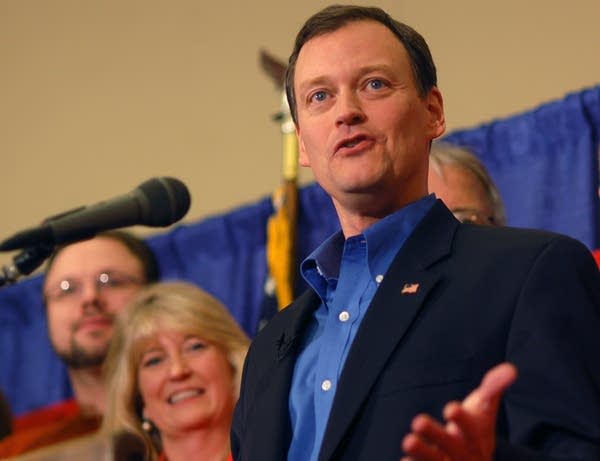Johnson, entering governor's race, aims to build new coalition
Go Deeper.
Create an account or log in to save stories.
Like this?
Thanks for liking this story! We have added it to a list of your favorite stories.

Hennepin County Commissioner Jeff Johnson, the latest Republican to enter the race for Minnesota governor, kicked off his campaign in the western suburbs on Sunday. He's hoping to stitch together a GOP coalition from factions that have been at odds with each other in the last few election cycles.
MORE COVERAGE
• Audio: Full speech on Capitol View
Johnson made his announcement to a roomful of supporters at the community center in Hamel. Like most Republicans looking at the race for governor in 2014, Johnson said he was worried about the direction of the state under DFL Governor Mark Dayton and the DFL-controlled Legislature. He said he doesn't believe most Minnesotans agree with their plan to raise taxes.
Turn Up Your Support
MPR News helps you turn down the noise and build shared understanding. Turn up your support for this public resource and keep trusted journalism accessible to all.
"It is a state where the big debate in St. Paul isn't about whether to increase taxes on clothing versus haircuts or, god forbid, beer but how we unleash that creative innovative power of every individual to grow our economy and make us all a little bit more prosperous."
Johnson said he's focusing his campaign on three issues: jobs, education and improving government services. His talking points concentrate on creating a low tax environment to bolster economic development in the state and on tackling Minnesota's achievement gap in education. He told reporters after his speech that he's unlikely to support any tax increases if he's governor.
"When someone can show me that government is spending the money it already has responsibly and efficiently and without wasting anything and on programs that actually produce results and that we really have cut the fat out of government -- come and talk to me about a tax hike," he said. "But we are so far away from that right now it makes my head spin."
Still, Johnson said he's not going to sign a no new taxes pledge because he worries it will be a distraction.
He's pledging, however, to abide by the party endorsement and will not run in a primary if he doesn't win the backing of GOP delegates. But he thinks he's best suited to win because he has the resume to win over conservative GOP delegates without alienating independent voters.
"We can't win a statewide race with only Republican votes. The numbers just aren't there in Minnesota," he said. "But what we also have to recognize is that we can't win a statewide race without a very excited and energized Republican base. We've got to have them both in the race for governor to win."
This isn't Johnson's first attempt at statewide office. He lost his bid for attorney general in 2006 to Democrat Lori Swanson.
He's the second major Republican to announce he's running for governor. Orono businessman Scott Honour announced his candidacy last month.
There are several more Republicans who are thought to be considering a run. They include state Rep. Kurt Zellers; state Sens. Dave Thompson, Julie Rosen and David Hann; and Hennepin County Sheriff Rich Stanek.
Zellers, who has served as speaker of the Minnesota House, says he won't make a decision until the legislative session is over. He said, however, that he knows the state since he worked for former U.S. Sen. Rod Grams and in his role as House Speaker.
"I've spent the better part of 20 years since 1994 traveling the state of Minnesota," Zellers said. "I know the different aspects of it. I know the different qualities and the great things about the Iron Range that are different from Worthington; or the Mayo Clinic that is different from Marvin Windows. When you look at all of those things and take them in perspective to understand them individually but how they fit together collectively for our state."
Gov. Dayton has repeatedly said he is running for a second term but is opting not to comment on any potential candidates until Republicans settle on a challenger.



